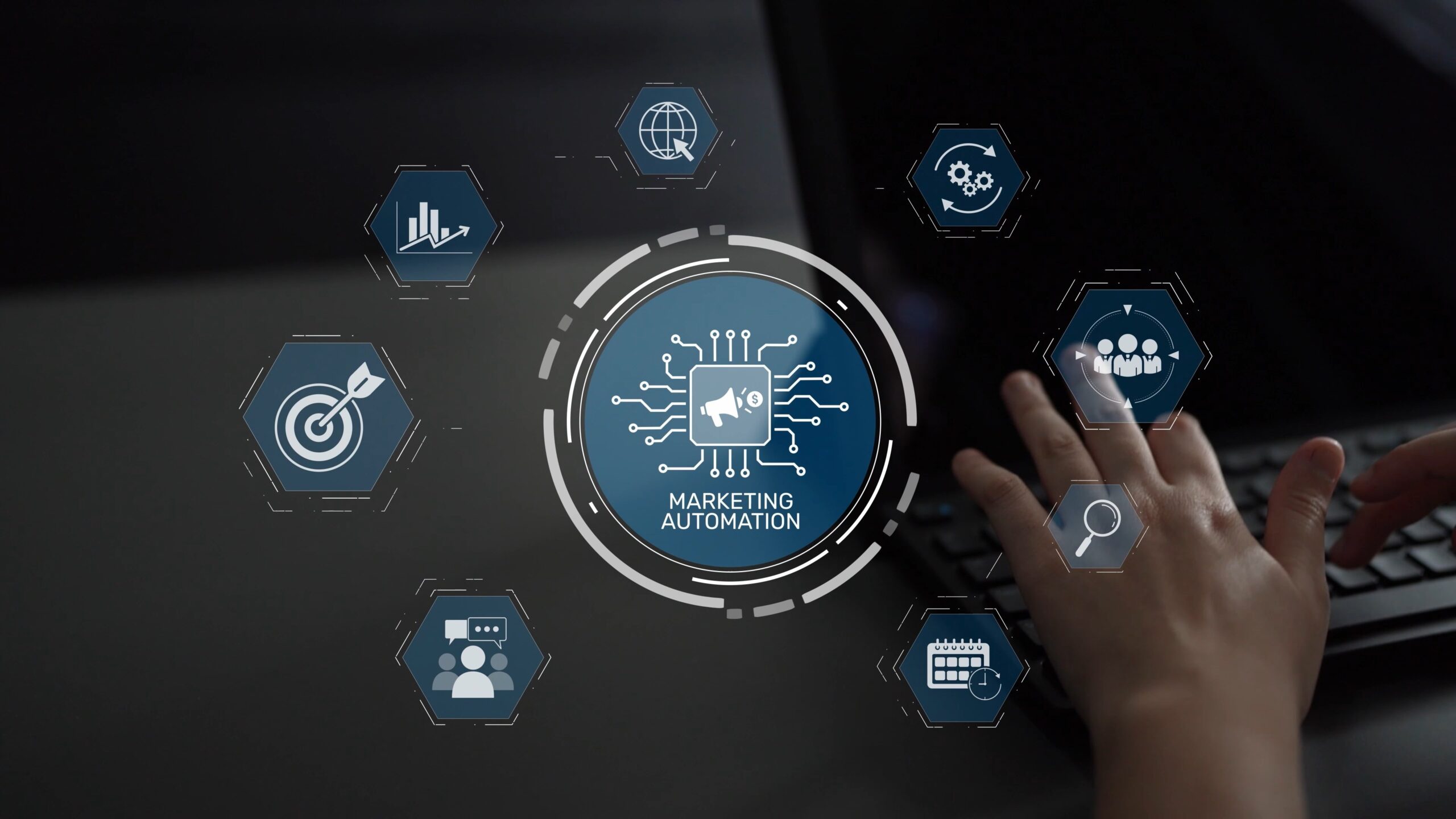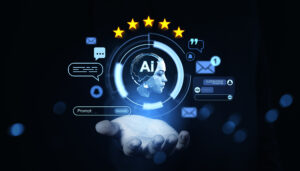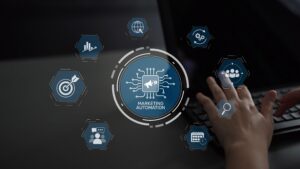How is AI transforming marketing automation from a reactive tool into an intelligent, predictive system that elevates decision-making? What new opportunities does AI-driven marketing automation unlock for personalization, customer targeting, and ROI? How can teams balance the power of AI with human judgment to ensure ethical, effective marketing automation in the future?
This blog explores how AI-driven marketing automation is reshaping the way brands operate by turning traditional workflows into intelligent, adaptive systems. Instead of relying on assumptions or static rule-based triggers, AI enhances marketing automation through machine learning, predictive analytics, and natural language processing, allowing campaigns to learn, adjust, and perform in real time. The article highlights how AI transforms campaign management, eliminates guesswork, integrates fragmented systems, and creates fluid customer journeys that feel more human and more personalized.
The blog also examines how AI-powered marketing automation improves targeting accuracy, boosts ROI, strengthens personalization, and anticipates customer behavior long before it occurs. It emphasizes the importance of ethical oversight, data privacy, and responsible model training as AI becomes more deeply embedded in marketing systems. Ultimately, the post illustrates how the future of marketing automation will pair AI’s intelligence with human creativity and emotional insight, creating a more efficient, relational, and high-impact marketing ecosystem.
AI-driven marketing automation isn’t just another trend sweeping through the digital world. It’s the future of how brands will connect and communicate. We’re no longer relying on instinct, loose assumptions, or quarterly performance snapshots to guide decisions. Today, AI is reshaping the entire ecosystem, transforming marketing automation into a dynamic, intelligent, and highly adaptive discipline.
If traditional marketing automation was the engine, then AI is the co-pilot analyzing performance in the background, predicting customer behaviors, optimizing campaigns in real-time, and stitching together insights from every corner of the digital landscape. The result? Streamlined workflows, more precise targeting, and marketing return on investment (ROI) that isn’t left to chance.
With the guidance of data scientists, AI-driven marketing automation is redefining how brands operate and empowering teams to make smarter and more responsible decisions.
The Role of AI in Modern Marketing Automation
Before we talk about how AI is transforming marketing automation, reflecting on its evolution is important. For years, automation was rigid, reactive, and built on assumptions rather than insight. Traditional marketing automation could only respond to what customers did, not understand why they did it or what they needed next.
AI flipped that script. Systems like machine learning, predictive analytics, and natural language processing (NLP) pushed marketing automation from rule-based workflows to intelligence-driven systems. Instead of waiting for behaviors to occur, AI anticipates them, sometimes even before the customer is fully aware of them themselves. You’ve probably seen this in action without realizing it, like when a website seems to “know” what you’re looking for before you do. Machine learning enhances marketing automation by identifying subtle signals invisible to the human eye. These models digest millions of behavioral breadcrumbs and translate them into meaningful patterns. Suddenly, marketers aren’t guessing. They’re seeing.
The system learns continuously, changing marketing automation from a static setup into a living, evolving intelligence layer that becomes smarter with every interaction.
Predictive analytics turns marketing automation into a strategic compass. These models don’t just analyze what happened; they forecast what will likely happen next. It’s the equivalent of having a meteorologist for customer behavior, one who improves with every dataset entered. NLP transforms marketing automation from mechanical to emotional. It reads words the way a psychologist might, decoding intention, tone, and sentiment across comments, reviews, chats, and social threads. Not just what customers are doing, but how they feel while doing it.
Insights like these are the core of what modern marketing automation is all about. It’s a system that respects individual behavior, context, and emotion. It’s automation with purpose and not just efficiency.
Streamlining Campaign Management with AI
I’m sure you understand all the ins and outs of building a major marketing campaign. All of the planning, the testing, the shifting, and the inevitable “wait, let’s redo that” moments. Marketing automation has always helped lighten that load, but AI doesn’t just reduce effort; it removes the friction entirely. But with the help of AI, marketing automation turns a basic workflow tool into an intelligent system that guides campaign management from beginning to end. Instead of teams starting with a blank page, AI analyzes historical performance, highlights patterns, and surfaces the most promising strategic direction before a single dollar is spent.
In more ways than one, marketing automation has become a compass rather than a checklist because it offers clarity instead of guesswork. So, campaigns no longer simply run; they learn, adjust, and respond in real-time based on live behavioral signals. There’s no lag, no speculation, and no waiting for next week’s report to fix this week’s performance. This kind of shift changes how teams operate. Instead of reacting to trends, they can now anticipate them—no more debating which creative direction might work. AI provides evidence-based guidance that comes from real customer behavior. And instead of spending hours pulling data across platforms, insights are surfaced instantly, allowing teams to direct their time toward more strategic, high-impact work.
And the real transformation occurs when marketing automation integrates your entire system, including customer relationship management (CRM), email platform, paid ads, social channels, and analytics, into a single, synchronized operation. We no longer have to worry about fragmented reporting and manually stitching data together. Now we have a cohesive system in place to elevate strategy, improve precision, and give marketers the space to focus on what truly matters: meaningful connection.
And when those systems are unified, something powerful emerges, a 360-degree understanding of the customer journey that empowers marketers to intervene at the right moment, with the right message, and in the right channel. This is what enables a brand’s ability to move and adapt to experiences that mirror how customers behave. Instead of forcing customers through predetermined paths, AI allows journeys to unfold organically, guided by context and intent. It’s the kind of evolution that doesn’t just make marketing more efficient, it makes it more human, more responsive, and ultimately more aligned with how people want to be understood and engaged.
Enhancing Personalization and Customer Targeting
In the old world of marketing automation, segmentation lived almost entirely in demographic buckets like age, income, and location. Useful, but limited. Demographics can’t tell you why someone paused on a product video, scrolled past an offer, or hesitated at checkout. They don’t reveal motivation, sentiment, or context. AI shifts marketing automation into a new era by adding behavioral nuance, which captures the subtle signals that reveal what customers care about, what frustrates them, and what they might need next. Instead of broad categories, AI analyzes search patterns, browsing habits, purchase cadence, and even how long a user lingers on a particular image.
With AI-powered marketing automation, personalization becomes far more than using someone’s name; it becomes an actual one-on-one conversation. Homepages adapt in real time. Product recommendations align with intent, not assumptions. Offers shift based on micro-engagements. Timing matches each person’s natural rhythm.
But the real transformation emerges through predictive targeting. AI pays attention to individuals based on their behaviors, and it anticipates what they’re likely to want next. A customer exploring a category may see curated recommendations that meet them exactly where they are. A user showing subtle signs of disengagement receives a reactivation flow designed to re-spark interest.
This type of automation becomes proactive rather than reactive, stepping in at the right moment with just the right message. And this is where loyalty is built, not from personalization alone, but from customers feeling genuinely understood. AI helps create relationships that are rooted in relevance and care, strengthening the connection between the brand and the consumer in ways it never could before.
Improving ROI through AI-Driven Insights
Marketing teams have always chased ROI, with limited visibility and a lot of guesswork. For decades, leaders relied on fragmented data, post-campaign reports, and intuition to piece together what worked and what didn’t. But AI changes that dynamic entirely. It brings clarity, replacing uncertainty with precision, and elevates marketing automation into an intelligence engine capable of seeing what humans might miss.
With AI, marketing automation doesn’t just execute campaigns; it informs them, guiding strategic decisions long before a launch takes place. Predictive models estimate customer lifetime value, likelihood, conversion probability, and the projected impact of budget shifts. It’s like having a strategic advisor embedded within marketing automation, one that minimizes risk and surfaces high-potential opportunities ahead of time.
But the value doesn’t stop with forecasting. AI improves marketing automation by measuring ROI in real-time, eliminating the waiting game after a campaign is over. Right away, it shows the assets that drive conversion, which audiences meaningfully engage, which channels underperform, and which touchpoints actually influence behavior. This allows marketers to pivot with agility rather than react weeks later. And because machine learning models evolve with every new data point, marketing automation becomes a continuously improving system, sharper in its targeting, smarter in its sequencing, and more precise in its timing.
Over time, AI helps marketing automation move from being a tactical tool to becoming a true strategic partner. It doesn’t replace human decision-making; it strengthens it, enabling marketers to operate with greater intelligence, confidence, and creativity, all while driving significantly higher ROI.
Overcoming Challenges in AI Marketing Automation
Even with extraordinary potential, AI is not always neutral. So, that means leaders have to approach AI-powered systems with both awareness and responsibility. The rise of marketing automation has accelerated what teams can accomplish, but it also amplifies the need for ethical guardrails. Data privacy and compliance sit at the center of this conversation. Customers expect transparency, regulators demand accountability, and brands must ensure that the data they collect is treated with respect, obtained with consent, and handled with care.
Trust is not a byproduct; it’s an asset. Just as important is understanding bias in AI models. Since these systems learn from historical data, there is a risk of any imbalance. It can be subtle while quietly influencing, targeting, messaging, and personalizing. That’s why regular audits and diverse datasets are essential. But even with responsible data practices, integration remains a challenge.
AI into environments isn’t a plug-and-play moment; it requires training, alignment, and a cultural shift toward shared ownership of the technology. Teams need to understand, trust, and feel confident using the system for it to deliver real value. But even with this advanced technology, more than anything, teams cannot over-rely on AI. These tools can optimize, predict, and automate, but they don’t have the capability to empathize the way that humans can.
They can surface insights, but they can’t replace human intuition or creativity. The strongest outcomes emerge when the analytical power of AI meets the emotional intelligence, ethical judgment, and imagination that only people produce. Responsible leaders recognize that AI doesn’t remove the human element of marketing; it makes that human element even more essential.
The Future of AI in Marketing Automation
We’re stepping into a new era of AI, where marketing automation evolves from intelligent tools into a dynamic, autonomous system set to understand human behavior with sophistication.
We’ll also see generative AI accelerate in tasks like drafting emails, writing copy, creating visuals, and even producing personalized video content. This allows human teams to focus on strategy, storytelling, and creativity, as these are the key areas where intuition and emotional intelligence matter the most. Predictive lead scoring will also advance, with models identifying high-value prospects long before they actively enter the funnel, enabling brands to prioritize time and resources with greater accuracy.
The biggest shift will come from autonomous marketing systems that are capable of adjusting campaigns across channels by learning from every interaction and refining messaging on the fly, as well as personalizing experiences that would be impossible to do manually. This is the future of marketing: systems that don’t just support decisions but enhance them, amplifying what teams can achieve while still relying on human oversight and ethical judgment.
To stay ahead, marketers will need to evolve alongside these technologies. Building AI literacy will be essential, not to become data scientists, but to understand how models work and how to challenge their outputs responsibly. Creativity will become even more valuable as automation handles execution, and humans focus on big ideas that differentiate brands.
Ethical leadership must remain a priority because ensuring that every automated decision aligns with values, transparency, and fairness is critical in allowing these systems to work alongside us. Marketers must remain curious and experiment boldly as new AI capabilities are discovered. Just as this landscape is evolving, we have to evolve with it. Those who know how to partner with AI are wisely bringing the humanity that turns insights into impact, drafting the course of the future.
AI-driven marketing automation is redefining what’s possible. It’s accelerating workflows, deepening personalization, improving ROI, and transforming marketing into a discipline rooted in data, empathy, and meaningful connection.








